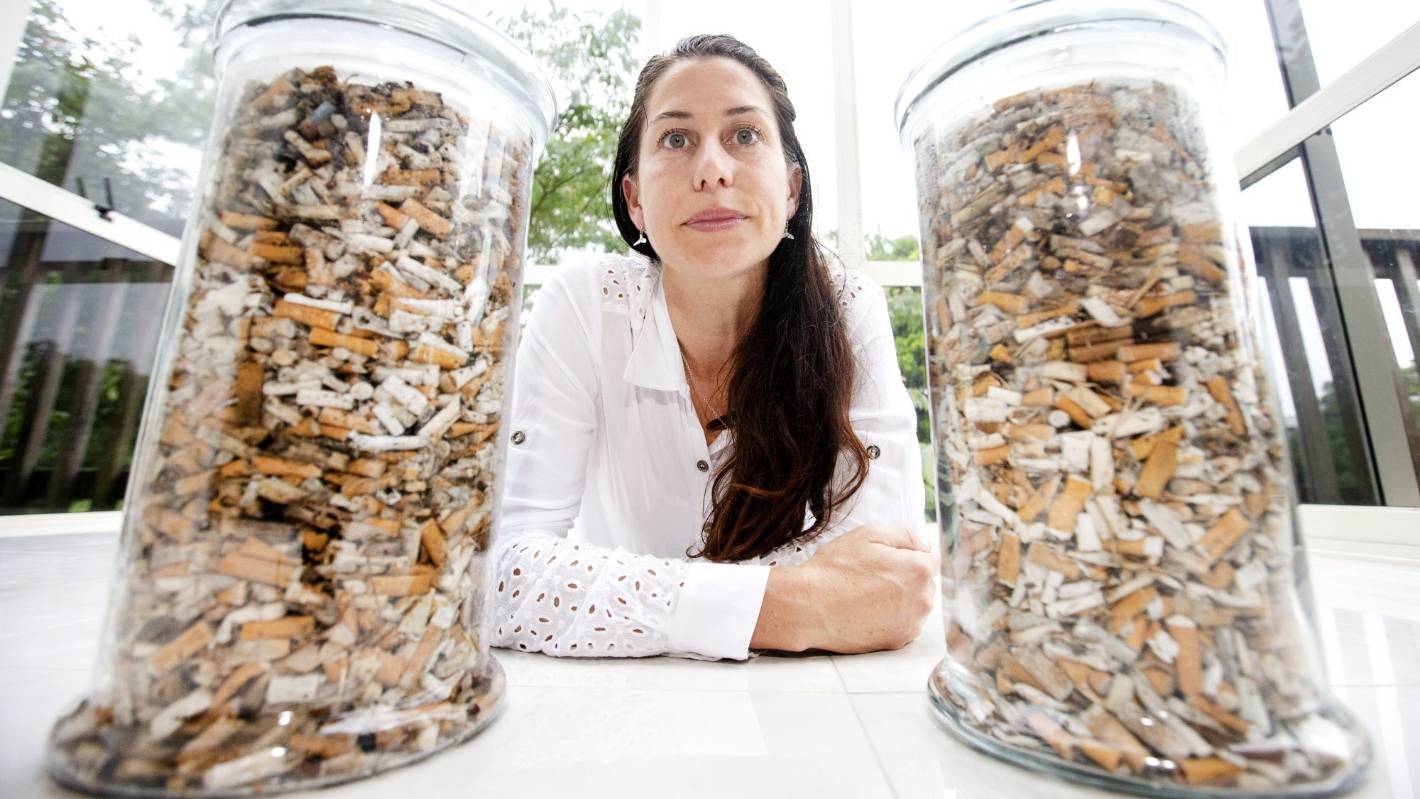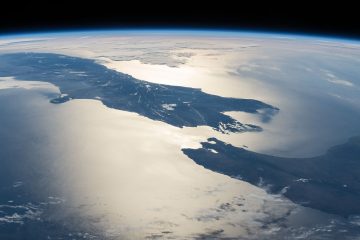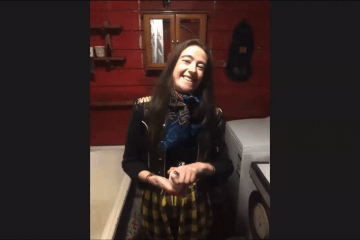10,000 Butts In Ten Days Campaign

Lorella Doherty, Director of Rethinking Plastic Revolution, educates and inspires people throughout Aotearoa about plastic pollution. She uses her passion for the ocean and earth and her Marine Biology and Conservation Degree to educate people about the effects plastic pollution has on the marine environment in particular. She facilitates local beach cleans, collaborates with other environmental organisations on plastic awareness projects and events, is a marine plastic artist, and co-ordinates projects to raise awareness about plastic pollution. Such as her most recent kaupapa 10,000 Butts In Ten Days. A campaign to raise awareness that cigarette butts are plastic, that they do not break down as people may think, and that they are highly toxic to aquatic life.
As a plastic educator, I knew that cigarette butts were plastic. But admittedly I would turn a blind eye to them on my daily beach cleans.
I found them smelly, toxic and a tad disgusting. So I convinced myself that it was OK that I picked up every thing but.
I guess when you choose not to see something, you manage to forget it is even there.
Most of us walk past hundreds of cigarette butts daily, and often do not even notice them.
When something is so prolific and so common, it is very easy for it to fall under the radar.
This is the story of how my radar was turned on (full beep), and pretty much got stuck on full beep!
One day a few months back I was walking along the beach on one of my daily beach cleans and I walked past butt after butt after butt. It had been raining the night before and there were so many that had came down the storm waters. There was a lot of plastic, but the butts; I kept walking past. After a while I started feeling guilty that I was leaving them behind; knowing they were plastic pollution.
So I retraced my steps and ended up picking them all up. In ten minutes I had found close to 100. That was where the beeper on my radar began.
I started questioning hundreds of people if they knew butts were plastic. Almost 100% of the people I asked were stunned to know they were in fact plastic. They had no idea. This is about when my beeper was going at full noise.
At this point something in me went “hang on, this is simply an awareness thing” (or lack of). If people do not know they are plastic and do not break down, we have a bit of a problem. The most littered item in the world, the most common single item found on beach cleans world-wide and in Aotearoa; because people don’t realise they are actually dropping a highly toxic plastic that does not break down like people think?
Surely that simply means we just need to change that perception.
For the next few weeks my mind thought of not much else. I spent my spare time researching the science behind the make-up of cigarette butts and looking into what actions had been taken, both in Aotearoa and the rest of the world to combat cigarette butt pollution. I also organised a meeting with my local council to chat about how to tackle this in Taranaki, which they supported.
A few weeks after that beach clean, an idea jumped into my head (my radar must have had some weird automatic function that never switched off).
If I could collect about 100 butts in 10 minutes at the beach, then surely it should not take me too long to collect 1,000 butts in one day. And in ten days I could have collected 10,000. I am sure that number could be great for raising some awareness!
I knew NZ Seaweek was coming up and so it seemed perfect to tie them together.
I put my fingers to work and emailed all the sustainable companies I loved and had good relationships with to ask for their support. I created a Pledgeme campaign to get some backing so that I could advertise further, get a campaign t-shirt printed and look at getting a small movie created at the end of it. Many people jumped on board and the momentum was rolling.
Little did I know the journey this would really take me on!
I had no problems collecting the butts, in fact I could have collected them all in the corner of one supermarket carpark in a couple of hours.
Obviously that was not the point. I wanted to collect information as to the worst affected areas, I wanted to understand people’s dropping behaviors, and I wanted to be out picking up butts everyday from various locations, chatting to people and spreading the awareness as far as I could.
During the campaign I had some amazing chats with people. My favourite was a day my daughter and I were at our local supermarket doing a quick pick-up from the car-park. We were giggling away having races as to who could collect the most in our jars, when a lady who was smoking came over and said “well, I am never going to drop another butt on the ground am I?” My heart filled with love and hope. What was so special was that my eight year old daughter got to experience change first hand. Children need that.
Over all the campaign was extremely successful: it blew my mind how much attention it got. Certainly not what I anticipated! With two newspaper articles both featured on STUFF, two TV3 interviews, seven radio interviews and various other features, it reached hundreds of thousands of people across Aotearoa.
However, for me, the butt pick up was only the start. The initial awareness has been raised, now it’s now time to put change into action.
In order to succeed, this change needs to come from different levels simultaneously.
These are the actions we will take:
- Work alongside my local council to create a holistic plan to tackle butts that we can also share with other councils as a model.
- Put signs in worst affected areas to educate people, such as car-parks and city gathering areas.
- Install butt bins in highly littered areas, where people are largely on foot. I do not believe butt bins should be the focus as they are not proven to reduce butt pollution substantially. However, a disposal option is necessary in some areas. And in studies there is a 60% decrease in butt dropping, when butt bins are combined with education.
- Roll out education in schools. We must make it common knowledge that butts are plastic and cause pollution, and that starts with education at a young age.
- Create a short but powerful campaign to spread the awareness further, including billboards in town, video advertisements, a social media campaign and a display of the 10,000 butts.
- Distribute a free PDF pack of printables (various sized posters and a flyer) to businesses, organisations, councils and individuals – allowing people power to do the work. Flyers distributed in rates and at WOF companies would be a great way to make the message far reaching.
- Install capturing systems at stormwater drain outfalls. I made one particularly stark observation over the course of picking up butts. I witnessed first-hand how street gutters piled up with butts during sunny spells and then completely cleared after a downpour, at which point beaches and stormwater outlets became totally littered with butts.
- Gutters and storm drains are a direct link to ocean pollution, so capturing butts at stormwater outlets to stop them flushing out to sea must be a large part of the remedy.
- Research the effectiveness of stormwater traps at the worst affected areas, such as directly outside bars in town or carparks.
- Explore whether littering fines could be a successful approach, including talking to other councils who are doing this already to learn from their experience.
- Work with commercial waste minimisation contractors to determine business’ legal obligations (if any) to prevent cigarette butt waste and how they could be educated further.
Some longer-term actions could include advocating for government regulation under the Waste Minimisation Act 2008 to make cigarette producers and retailers more responsible for butt waste. This might include:
- Mandatory labelling on cigarette packets and signage in places that sell cigarettes, informing consumers that cigarette butts contain plastic
- Requiring cigarette producers to contribute to the cost of stormwater nets and traps to capture butts
- Encouraging product redesign such that butts simply don’t contain plastic anymore, either through mandatory price incentives or a direct prohibition on the use of plastic in cigarette butts.
Overall I feel very positive with how the campaign went and where it is headed.
Of course, I am just one person operating mostly on my own. But I guess when passion is driving you, when you have a community of people who support you, when you have a supportive council and when your radar is beeping in your ear so loudly that there really is no option other than to keep listening to that beeper and doing all you can to stand up for what feels right in your heart – anything is possible, including no more cigarette butts polluting our beautiful Papatūānuku.







